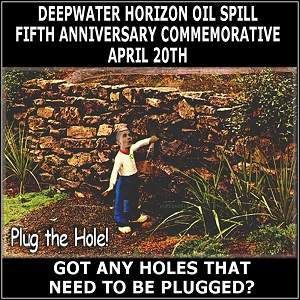
Posted on 04/29/2015 10:54:20 AM PDT by thackney

Nature healed what man inflicted in 1979 Gulf spill Read more: June 10, 2010" "A lot of the fishermen around here will tell you that the fish never came back,'' says Vega Morales. ``They'll say, `Oh, in the old days, you could catch fish with your hat, it was so easy.' That's how we are, always talking about the one that got away. But the truth is, after maybe nine months or so, it was back to normal." " (Ixtoc 1)
"Soto, who followed the fish and shrimp population off Mexico closely, found to his surprise that for most species the numbers had returned to normal within two years."
--------------------------------------------------------
Oil Cleanup Expert Comments on Gulf Spill
"Every year 2 million to 12 million tons of oil naturally seep from the ocean floor and into the sea. In fact, many of the deposits in the Gulf of Mexico were discovered by observing these oil seeps, which is why the hydrocarbon degraders are everywhere, waiting for their “dinner” or fuel. Fishermen should be prepared for the extra catches that are coming because after every major oil spill there’s an explosion of local fish."
"But before a fish explosion can happen, the microorganisms need to be able to get to the oil and digest it. Since oil and water don’t mix, adding a dispersant will accelerate the breakdown of the oil, making it more available to the microorganisms."
---------------------------------------------------------
1979's Ixtoc oil well blowout in Gulf of Mexico has startling parallels to current disaster
"Even with those obstacles, fishers still managed to amass an impressive catch in 1979 -- when oil was gushing into the Gulf."
"Researchers in Campeche found shrimping that year enjoyed a high. The total tonnage of seafood caught in the Gulf of Mexico grew by 5.9 percent compared with the previous 12 months, and octopus capture in the Bay of Campeche beat the previous record by 50 percent."
"Tunnell's follow-up research into life near Texas beaches showed that organisms whose populations were apparently reduced by the massive spill replenished themselves within a few years."
This ‘spill’ was oil in it’s natural state... the kind of stuff that’s been seeping into oceans since the beginning of time.
The problem with the EXXON spill was it was ‘cracked’ oil - something the oceans’ didn’t know how to deal with.
What?
From wikipedia:
Because Prince William Sound contained many rocky coves where the oil collected, the decision was made to displace it with high-pressure hot water. However, this also displaced and destroyed the microbial populations on the shoreline; many of these organisms (e.g. plankton) are the basis of the coastal marine food chain, and others (e.g. certain bacteria and fungi) are capable of facilitating the biodegradation of oil. At the time, both scientific advice and public pressure was to clean everything, but since then, a much greater understanding of natural and facilitated remediation processes has developed, due somewhat in part to the opportunity presented for study by the Exxon Valdez spill.
:) Thanks.
Degradation still happens. Different microbes for different environments, even underground. The oil itself becomes a set of nutrients.
Right you are. The bigger problem with really old gas stations is contamination of the soil by the lead "octane boosters" that used to be added to gasolines (tetramethyl to tetraethyl lead). Even if the bugs eat the hydrocarbon parts, the lead heavy metal remains.
My dad often says that the U.S. military needs to develop a new biological weapon to deploy in the middle east that turns crude oil into sand.
Disclaimer: Opinions posted on Free Republic are those of the individual posters and do not necessarily represent the opinion of Free Republic or its management. All materials posted herein are protected by copyright law and the exemption for fair use of copyrighted works.